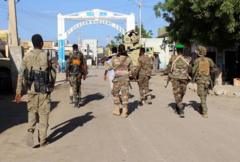The upcoming nuclear discussions between the US and Iran are marked by significant gaps in expectations and strategy, particularly with the US insisting on comprehensive dismantlement of Iran's nuclear program, while Iran appears divided on potential concessions amidst its economic struggles.
Divergence in US-Iran Approaches Ahead of Crucial Nuclear Talks

Divergence in US-Iran Approaches Ahead of Crucial Nuclear Talks
With diplomatic talks looming, the US and Iran appear entrenched in their positions regarding nuclear capabilities, leading to concerns over potential conflict.
In the backdrop of escalating tensions, President Trump is intensifying his focus on Iran, seeking to address what he considers "unfinished business" from his previous term. His approach includes reinstating a policy of "maximum pressure" that has led to renewed sanctions on Iran following the US withdrawal from the Joint Comprehensive Plan of Action (JCPOA) in 2018.
The JCPOA was an agreement involving six nations, aiming to curb Iran's nuclear ambitions in exchange for economic benefits. Since the US exit from the agreement, Iran has increased its uranium enrichment, raising alarms regarding its capability to develop nuclear weapons. Recent estimates by the International Atomic Energy Agency suggest that Iran possesses enough enriched uranium that could lead to the production of six nuclear bombs if further processed.
As Trump attempts to engage Iran diplomatically—having sent a letter to Supreme Leader Ali Khamenei suggesting negotiations—there are concerns that both sides may struggle to find common ground. The US demands include total dismantlement of Iran's nuclear program and cessation of military support to groups such as Hezbollah and the Houthis. Iran, grappling with a struggling economy and a weakened regional position, acknowledges the need for sanctions relief but contends that complete restrictions on nuclear enrichment remain a red line.
Amidst these negotiations, Israel remains vigilant, emphasizing its stance that any agreement must lead to the total elimination of Iran's nuclear capabilities. Israeli Prime Minister Benjamin Netanyahu has even drawn comparisons to Libya’s dismantlement of its nuclear program under similar circumstances. However, Iran’s historical resistance to disarmament under external pressure complicates any parallel.
Should talks collapse, Israel may contemplate military actions against Iran's nuclear sites, yet analysts note that any such operations would face significant challenges due to the fortified locations of these facilities. Furthermore, it risks dragging the US into another protracted conflict, a prospect that contradicts Trump’s narrative against "forever wars."
With the window for negotiations narrowing, both the US and Iran are left grappling with their respective positions—an escalation that could have dire implications if diplomatic efforts falter. As history suggests, expedited negotiations often lead to complicated outcomes, underscoring the urgency for a careful approach in resolving this high-stakes issue.
The JCPOA was an agreement involving six nations, aiming to curb Iran's nuclear ambitions in exchange for economic benefits. Since the US exit from the agreement, Iran has increased its uranium enrichment, raising alarms regarding its capability to develop nuclear weapons. Recent estimates by the International Atomic Energy Agency suggest that Iran possesses enough enriched uranium that could lead to the production of six nuclear bombs if further processed.
As Trump attempts to engage Iran diplomatically—having sent a letter to Supreme Leader Ali Khamenei suggesting negotiations—there are concerns that both sides may struggle to find common ground. The US demands include total dismantlement of Iran's nuclear program and cessation of military support to groups such as Hezbollah and the Houthis. Iran, grappling with a struggling economy and a weakened regional position, acknowledges the need for sanctions relief but contends that complete restrictions on nuclear enrichment remain a red line.
Amidst these negotiations, Israel remains vigilant, emphasizing its stance that any agreement must lead to the total elimination of Iran's nuclear capabilities. Israeli Prime Minister Benjamin Netanyahu has even drawn comparisons to Libya’s dismantlement of its nuclear program under similar circumstances. However, Iran’s historical resistance to disarmament under external pressure complicates any parallel.
Should talks collapse, Israel may contemplate military actions against Iran's nuclear sites, yet analysts note that any such operations would face significant challenges due to the fortified locations of these facilities. Furthermore, it risks dragging the US into another protracted conflict, a prospect that contradicts Trump’s narrative against "forever wars."
With the window for negotiations narrowing, both the US and Iran are left grappling with their respective positions—an escalation that could have dire implications if diplomatic efforts falter. As history suggests, expedited negotiations often lead to complicated outcomes, underscoring the urgency for a careful approach in resolving this high-stakes issue.





















